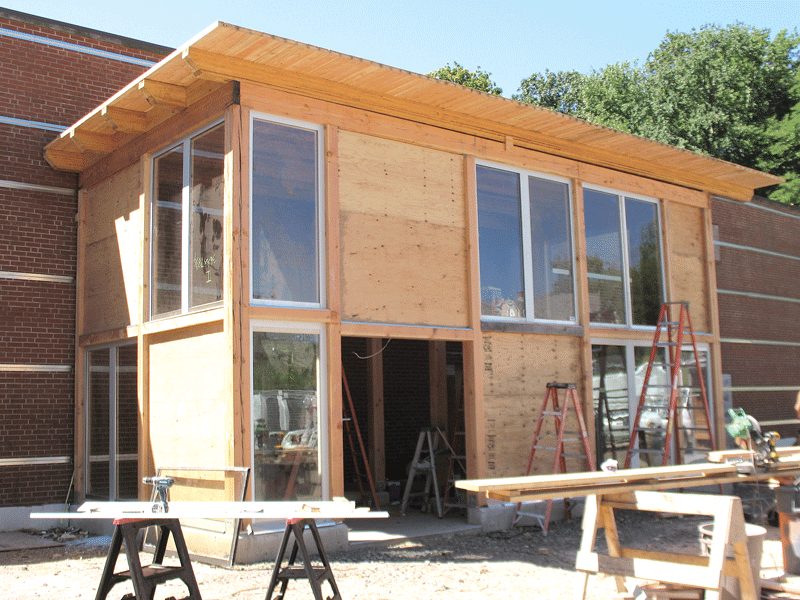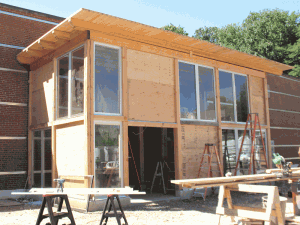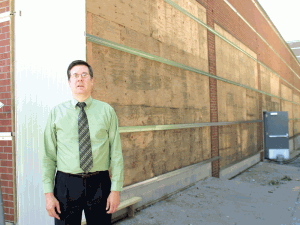
Greener Pastures
In Its New Home, EcoBuilding Bargains Models Its Mission
 For the past decade, the ReStore has been an increasingly popular source of recycled building materials, saving money for professional contractors and do-it-yourselfers alike, all while easing the burden on landfills. The store, now renamed EcoBuilding Bargains, has outgrown that space and will soon move into a much larger building nearby. And the way that structure is being renovated provides an effective case study in the value of green construction and energy efficiency.
For the past decade, the ReStore has been an increasingly popular source of recycled building materials, saving money for professional contractors and do-it-yourselfers alike, all while easing the burden on landfills. The store, now renamed EcoBuilding Bargains, has outgrown that space and will soon move into a much larger building nearby. And the way that structure is being renovated provides an effective case study in the value of green construction and energy efficiency.
John Majercak wants to lead by example.
And when EcoBuilding Bargains — formerly the ReStore — opens its vastly expanded retail center in Springfield later this fall, he’ll have the ideal showcase to demonstrate how homeowners and contractors can make profitable use of recycled materials and save money through energy efficiency.
Because that’s how the new store is being built.
The building in question — a century-old structure on Warwick Street that was originally home to the National Biscuit Co., then Steiger’s, and most recently a warehouse for Kavanagh Furniture — is being expanded and renovated from top to bottom, eventually tripling the retail space of the ReStore’s original Albany Street site and quadrupling its total area.
“When we purchased this property,” said Majercak, executive director of the Center for EcoTechnology in Northampton, which operates EcoBuilding Bargains, “we undertook an environmental remediation process. It was built at a time when energy costs were not a big deal, but were an afterthought. Now, it’s a modern building that’s going to use, by the time we’re done, about a third of the energy a building this size would normally use.”
That feat will be accomplished with an array of improvements — encompassing roofing and siding materials, insulation, and the systems that heat, cool, and illuminate the space — that promote cost savings through energy efficiency. Those strategies, combined with the copious use of recycled materials throughout the building, effectively turn it into an educational model of the store’s very mission.
At the Center for EcoTechnology, a 65-employee, 35-year-old nonprofit that provides practical solutions for going green at home and work, “our motto is, ‘we make green make sense,’” Majercak said. “And this is one example of that. By lowering our own operating costs and teaching people who come through here why we made these green improvements — and what they can do in their own homes — we’ve made this a teaching store as well.”
Do It Yourself

John Majercak says the store will be lined with cutting-edge insulated panels that seal in air, one of many facets of the building’s energy retrofit.
“The store sells low-cost building materials so people can fix up their homes,” Majercak said. “We get all kinds of stuff from other people’s homes and remodeling jobs; they donate it or hire us as a contractor to do the deconstruction ourselves.
“Over the years, we’ve just seen an incessant demand for what we do,” he continued. “Our store is now so stuffed, you can barely walk through. We know we can serve more people in a bigger facility and do more of our mission. Customers are going to be much better served by this building, which will have more parking and wider aisles. And with a new, computerized inventory system, we know what we have; it’s much easier for the customers and donors who work with us.”
The efficiency improvements — part of a $900,000 energy retrofit, a significant portion of the total $3.1 million project cost — begin on the exterior of the building, including a white roof to deflect heat and insulated panels lining the building that interlock in a way that seals out all air leakage. EcoBuilding Bargains will also “superinsulate” its roof, Majercak explained, using insulation donated from MassMutual when that company installed a solar array on its roof.
“They took their old insulation off because they needed to use a different system, but it’s fine, and they donated that to us, saving us at least $40,000 in insulation costs, and it’s helping us save a lot of energy,” he said. “There are all kinds of different details that all tie together to make the building really well-insulated.”
In addition, the 3 million-BTU, oil-fired boiler in the basement is being replaced with a 500,000-BTU gas unit, while infrared tube heaters located throughout the structure will heat building occupants but not the air.
“Say you’re in the sun, with the radiant heat — that’s what this feels like, the sun hitting you,” Majercak said. “For a big, open space, it’s very efficient because it allows the air temperature to be lower even though you feel comfortable. And in the offices, we’re using heat pumps to take advantage of the difference between outside and inside air.”
That model of efficiency extends to lighting as well; much of the store will feature sensor-controlled lights that maintain a low level when no one is around them, but become brighter when someone walks in. “That saves energy, too,” Majercak said.
In addition, “we’re using reused materials everywhere — we reused timbers, sliding glass door panels, the flooring is recycled … these are all examples of reuse, and that’s what we’re all about.”
The goal, besides reducing costs while greatly expanding floor space, is to demonstrate the types of changes people who visit the store can make in their own homes.
“It’s been a lot of fun, actually,” Majercak said. “We can walk around and talk to people and show them it is possible, and there are benefits to it. We use household examples, too — no one uses infrared tube heaters, but for homeowners, we have workshops and examples of products they can use in their homes, as opposed to stuff used at the commercial level.”
Dollars and Sense
The simple fact that the ReStore needed a new home testifies to the growing popularity of its ‘reduce, reuse, recycle’ model.
“People who shop here do so because of the great deals, or they believe in the mission of keeping stuff out of landfills, or both,” Majercak said. “When we opened this up 10 years ago, there were maybe a dozen or two stores like it in the country. There are about 800 now, and we have our own association; I’m on the board of it.
“It just makes sense on so many levels,” he continued. “People — we Yankees, especially — are frugal and don’t want to throw something out if someone else wants to use it, but they also don’t want it sitting around their basement, either. What’s caught on is the whole concept of going green and the fact that there are societal benefits to doing those things. That’s exciting to me because, at the Center for EcoTechnology, we have a host of green services we can offer people, and now we can showcase them and tell people about them using this facility.”
Majercak expects the business to continue to grow, both through public awareness of the store and in its deconstruction efforts, which have “really taken off” in recent years.
“We’ve worked with Kent Pecoy, R.J. Chapdelaine, Dan Roulier, and some the other big builders around the area. They’ve used us for deconstruction, and we’re working throughout Southern New England and New York now, doing jobs,” he told BusinessWest.
“I think it’s something whose time has come. People shouldn’t just crunch up their house and throw it away. That’s catching on, and will be a big source of material for us over the next couple of years.”
EcoBuilding Bargains is reaping more than just new business, however. About one-third of the $3.1 million building rehabilitation is being funded by a capital campaign, while another third has come in the form of a low-cost mortgage from Westfield Bank; government funding covers a little less than one-third as well.
“The amount of support we’ve gotten to do this project is pretty phenomenal,” Majercak said. “We’ve always tried to operate this store as a self-sufficient nonprofit, so we can cover our costs through the revenue we generate.”
In addition to the capital-campaign support, “a number of businesses have contributed monetary resources or products or in-kind services — lawyers, architects, all kinds of vendors,” he noted. “All the gas pipe was donated from local pipe suppliers. People have been very kind and very supportive.
“When we knew we were going to expand,” he continued, “we chose purposely to stay in Springfield because this is our target market, and it’s also mission-consistent to fix up an older building — but also because we have such great support from the community, the government, and residents. It’s just a great place to do business.”
Joseph Bednar can be reached at [email protected]






